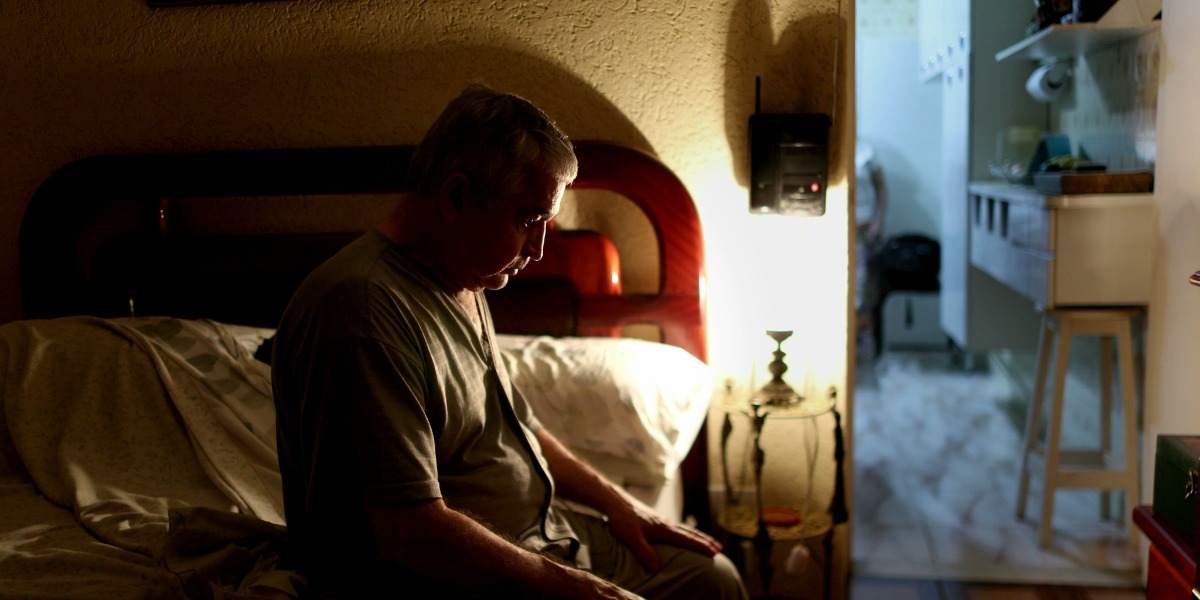Ever wonder how a bad mattress affects your sleep? Here’s everything you need to know.
If you’re reading this, chances are you’re not getting enough sleep. We’d also guess that you’re quite sure your uncomfortable mattress is the culprit. If your mattress is old and sagging, or even if it’s brand new but just too firm or soft, then we can tell you that your suspicions were spot on.
A bad mattress can cause a wide range of physical and mental health problems. It can cause body aches, compromise your immune system, and even instigate depression. And these aren’t separate maladies — they’re all connected. And what connects them? Sleep.
Good quality sleep isn’t a luxury — it’s a necessity. Sleep allows our bodies to physically and mentally recuperate. Poor sleep quality prevents that healing, and when you sleep poorly for multiple nights, the severity of the symptoms multiplies as well.
In this guide, we’ll explain what a bad mattress can do to you, physically and mentally. We’ll also explain how to make a bad mattress more comfortable.
But first, let’s begin by defining what makes a mattress ‘bad’ in the first place.

What defines a bad mattress?
Most of the signs of a bad mattress are clear as day. These apparent signs are caused by wear and tear, and you’ll begin to notice them as the mattress nears the end of its life.
Here are five signs of a bad mattress:
1. Your mattress begins to sag
Sagging is the most common cause of bad mattress symptoms. You’ll notice a depression forming in the centre of the mattress or even at the edges. Where the sagging occurs depends on where you, or your partner, sleep.
The cause of the sagging depends on the construction of the mattress. For a spring mattress, the springs are likely losing their structure. For a foam mattress, the foam is losing its shape. In a hybrid mattress, it’ll be some combination of the two.
Either way, fixing mattress sag is nearly impossible because the materials are simply past their prime.
2. Your mattress is covered in stains and smells musty
Mattress stains are inevitable. They’re the inevitable result of living. Who doesn’t enjoy a glass of wine or a cup of tea in bed now and again? Who can be blamed for a cheeky midnight snack in bed or even dinner on the doona while you binge-watch a show? And if you’ve got children or pets, you know there’s no avoiding an accident.
Food, drink and urine stains can be challenging to get out of mattresses. Even if you mostly remove them, minor stains can accumulate over the years to form major ones.
Now, let’s add sweat into the mix. We each lose about a cup of water per night in perspiration. Much of that sweat seeps into the mattress. All these factors combined can lead to a thoroughly stained mattress loaded with foul odours, not to mention bacteria.
Food, drink and urine can also have a corrosive effect on the materials and components within the mattress, dragging down its lifespan.
3. Your mattress squeaks, creaks, and makes funny noises
If you have a spring or hybrid mattress, you’ll notice a squeaking or metallic grinding sound every time you shuffle about on it. And we’re not even talking about rhythmic shuffling — simply changing position during the night will cause your mattress to groan.
As the springs in your mattress lose their shape, their coils will begin to grind against each other. Any lightly corrosive liquids spilt on the bed that have made it to the springs can also cause squeaking.
It won’t matter how deep a sleeper you are once the cacophony of springs begins — it’ll be hard enough to fall asleep, let alone stay asleep.
4. Your mattress was extremely cheap
When it comes to mattresses, you get what you pay for. Cheaper mattresses keep their prices low by skimping on quality materials and lowering their manufacturing standards. It might be the case that you’ve bought a second or third-hand mattress; even if it’s by a reputable brand, you’ll still feel its age.
Please don’t feel this is an attempt to shame; we all have to live with what we can afford. But if your mattress is bad enough that its sagging structure, creaking springs and musty smells consistently deprive you of a full night’s sleep, then there’s a problem.
If the mattress is horrible enough, you’ve got to decide if you’d rather pay the price of a new supportive mattress or the cost of chronic sleep deprivation.
We appreciate that it’s not always an easy financial decision, but we would argue that your health is priceless.
5. Your mattress is not suited to your sleep style
This is not an obvious sign of a bad bed. Many people aren’t aware of just how important it is to choose a mattress that supports their preferred sleep style.
The critical factor here is the mattress feel. Ideally, you’ll want a mattress that provides the right firmness or softness to support your spine and joints as you sleep on your back, side or stomach.
However, as the structural stability of your mattress begins to fail, it will no longer be able to support your body. That leads to the morning back and neck aches we all dread.

How long should a mattress last?
A quality mattress will last for ten years, at minimum.
One easy trick to tell if you’ve found a quality mattress is to check its warranty. You’re on the right track if its warranty exceeds the average 10-year lifespan.
If you’ve noticed any of the five signs of a bad mattress, or if your mattress is over ten years old, it’s probably time to buy a new one. As it happens, we make the best mattresses in Australia. And they come with a 20-year warranty.

Effects of a bad mattress: what can a bad mattress cause?
Now you know how to identify a bad bed. But what are the symptoms of sleeping on a bad mattress?
Can a bad mattress make you tired? Absolutely, but that’s quite a generous understatement. While we are talking about distinct areas of pain, it’s important to remember your body is one unit; a failure to support one area of the body will have cascading effects across the entirety of it.
Let’s dig into the details.
The physical cost: can a bad mattress cause body aches?
Can the wrong mattress cause back pain?
Yes. A sagging, unsupportive mattress absolutely causes back pain. How it does so depends on your sleeping position.
If you sleep on your back, the sagging mattress will fail to keep your spine in neutral alignment. Your posture will curve as it sinks, curling you inward. If you sleep on your stomach, you will begin to bend backwards and hyperextend your back.
If you sleep on your side, your spine will curve to the side, which makes for a particularly heinous soreness in the morning.
Can a bad mattress cause hip pain?
It sure can. Just as it fails the spine, an inferior mattress will also fail to support the lower back, hips and knees. Through the night, your hips will fall into misalignment, putting stress on the surrounding tendons, muscles and joints and causing hip pain. But that might be the least of your worries.
Sleeping with misaligned hips on a bad mattress can also cause sciatica and piriformis syndrome.
- Sciatica is caused by the compression of the nerve passing through the lower back.
- Piriformis syndrome is a spasm in the piriformis muscle in the buttock; it causes pain, tingling or numbness in the buttocks and legs.
If your mattress is causing or exacerbating these conditions, we strongly suggest you seek the advice of a medical professional and purchase an appropriately supportive mattress.
Can a bad mattress cause chest pain and stomach pain?
Consistent stress on the shoulders and hips can cause chest and stomach pains.
If your shoulders are misaligned night after night, they’ll sink into each other. This will stretch tight the muscles of the upper back and compress the pectoral muscles of the chest.
If your hips are misaligned or your spine hyperextends through the night, your abdominal wall will be in a state of constant stress.
Can a bad mattress cause headaches?
When your skeleton is misaligned, your muscles are forced to counter the effect. Bad mattresses cause headaches when they fail to support the shoulders and head; the tension of the muscles eventually results in headaches and migraines.
A bad mattress will only exacerbate the poor posture and muscle tension caused by a sedentary lifestyle. If you sleep on an unsupportive bed, then get up and immediately begin your workday sitting down and hunched over a computer screen that’s too close to your eyes, then headaches and migraines become inevitable.
Sleeping on a proper mattress can reduce your chances of body aches and headaches, but it must work in tandem with other lifestyle changes.
Can a bad mattress cause snoring?
Several factors can cause snoring. One of them is the level of support your mattress provides.
As you drift into sleep, your muscles relax; this includes the muscles of the throat and the tongue. As the head lolls to the side, these relaxed muscles block your airways, causing you to snore.
One solution to snoring is buying a supportive pillow to keep your head aligned. But a pillow will not be enough if your mattress has lost its supportive properties. Because of your poor mattress, the blockages in your airway may now be deeper in your chest and lungs.
Depending on the cause of your snoring, it can be more than just an annoying side effect of a bad mattress. It can be dangerous.
Can a bad mattress cause dust mites, allergies and poor hygiene?
Let’s put the supportive failures of bad mattresses aside for a moment and focus on their hygiene.
Old mattresses are rank, with stains, odours and bacteria. They’ve been drenches in who-knows-what, and if they haven’t had a quality waterproof mattress protector, then that gunk is likely to have permeated through the fabric and foam of the mattress.
Bacteria-laden old mattresses can cause skin irritations, rashes, respiratory allergies, and illness. They can cause or exacerbate eczema and hay fever. If you or your loved ones have particularly sensitive allergies, old beds will wreak havoc on your immune systems.
Sleeping on a dusty, musty bed will leave you consistently sick even if you have no allergies. You’ll constantly be dealing with inexplicable coughs and colds. It will certainly affect your productivity at work, but continuously being a little bit sick will also dampen your personal life.

The mental cost: bad mattresses can mess with your head
Your physical and mental well-being are not separate. The failure to care for one affects the other. That’s not news. But that doesn’t mean it’s an easy fix.
Suppose you’re getting mentally or physically burned out with work, your hobbies, or any personal factors that make up your individual life. In that case, the solution for a healthy and consistent life can become hard to pin down.
But you sleep for a third of your life. Making an effort to maximise the quality of that sleep will result in wonders — that’s no exaggeration.
We’ve covered the physical cost of sleeping on a bad mattress, so now let’s look at the mental cost.
Can sleeping on a bad mattress reduce your memory retention?
As you sleep, your brain processes your short-term memories into long-term memories. This is a critical process, and you must be in a deep sleep for it to occur successfully.
When you sleep, your body and brain go through ‘sleep cycles’ made of different stages of consciousness. We won’t detail them here, but what’s important is that you will not be able to enter or complete these vital sleep cycles if you are constantly tossing, turning, and aching because of a bad mattress.
Consistent poor sleep will make you forget essential things, from work deadlines and personal anniversaries to skills, abilities and talents.
Can sleeping on a bad mattress reduce your focus?
Everyone knows this; nobody can focus when they’re tired. It doesn’t matter whether you spend your days driving long-haul trucks or playing video games. Even a single bad night can leave you too exhausted to focus on a task for even 10 seconds.
If you sleep on an uncomfortable mattress, you have no chance of performing your daily duties with your full competency.
Can sleeping on a bad mattress reduce your creativity?
There are many ways to define what creativity is, but we can be confident that the ability to focus and the ability to recall information and synthesise it into something new are pretty important.
If your poor-quality mattress is preventing you from getting a good night’s sleep, then you aren’t going to be as creative as you could be. You won’t have the mental agility to come up with exciting and unique ideas, and you certainly won’t have the mental stamina to sit down and practice your creative craft for any length of time.
Can sleeping on a bad mattress worsen your mental health?
Suppose you’re constantly exhausted, struggle to focus, can’t recall even the most basic information and don’t even have the energy to pursue your creative hobbies. In that case, a mental health crisis is sure to follow.
Poor sleep prevents you from lightening your mental and emotional burdens. It can cause depression or worsen it and any other mental illnesses you might be dealing with.
Managing mental illness requires a personalised, systematic approach under the guidance of a mental health professional. That is beyond our scope. But we are confident in saying that getting a good night’s sleep, and doing so consistently, will help bolster the effects of your primary treatments.

Quick fixes: how to get a good night’s sleep on a bad mattress
Now you know how a bad mattress can affect your life. But what to do about it.
Here are three quick fixes to make your old mattress more comfortable and supportive:
- Buy high-quality sheets to improve comfort
Lusciously soft sheets can add just enough padding to a lousy mattress to make it bearable and hopefully give you a better night’s sleep.
Our 100% organic bamboo sheets might just do the trick.
- Buy a mattress protector to improve hygiene
Breathable and cool mattress protectors can help keep you cool as you sleep, disperse sweat, protect your mattress and prevent the build-up of bacteria and other harmful allergens.
Our waterproof mattress protector could be just what you’re looking for.
- Buy a pillow to improve support
The right pillow can work wonders by supporting your head, neck and shoulders as you sleep. While not a complete solution, it can compensate for the lack of support from your old mattress.
You might find what you need in our range of Chiropedic pillows.
If you’re tired of being tired, it’s time to buy a new mattress. The best solution for a bad mattress is to replace it with a good one. There’s simply no way around that. Fortunately, Yinahla stocks Australia’s best mattresses. Have a browse, and let’s find you the perfect mattress.










